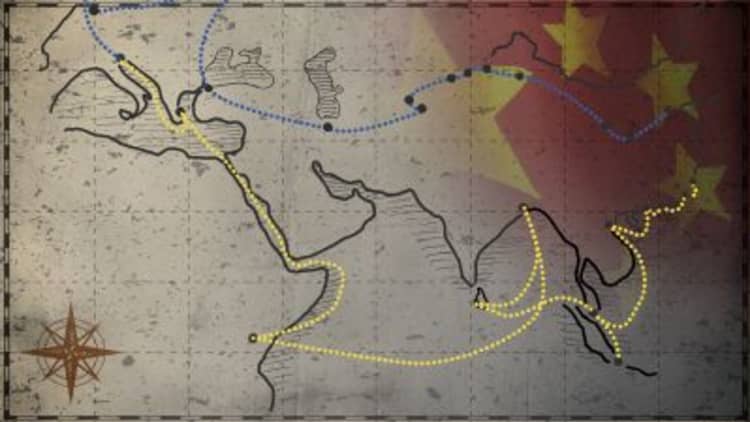
European banks and companies may be interested in participating in China's major globe-spanning investment initiative — but first, they need to actually learn more about its details, according to a top European Union official.
Speaking with CNBC on Thursday from Beijing, European Commission Vice President Maros Sefcovic said his conversations with major companies indicated that China needed to be more transparent if it wants to win European corporate buy-in for its "Belt and Road." That initiative, a cornerstone of Chinese President Xi Jinping's foreign policy, seeks to create a massive web of shipping, rail, road, and digital networks that establishes Beijing as a linchpin for the world.
China is reportedly seeking more outside involvement in its bid to invest in and support that infrastructure development, and Sefcovic is part of a lengthy list of global officials attending this week's Belt and Road Forum.
European companies, he told CNBC, are first and foremost looking for information.
"They would love to be more involved in the Belt and Road Initiative, but we need a little bit more information coming for our companies: how they can participate, how they can bid in the public procurement — and of course also the sustainable financing of this project is important because it's raised some concerns also in Europe," he said.
The worries about the financing approaches of the initiative come in the wake of several countries canceling or seeking to renegotiate their Belt and Road projects because of concerns about establishing onerous debt to Chinese sources. Notably, Sri Lanka relinquished a strategic port to Beijing in 2017 after it couldn't pay off its debt to Chinese companies.
Sefcovic, for his part, said China appeared to be addressing that issue and the others.
"I believe (Beijing) will solve them to the satisfaction of European companies, to the financing side of these deals," he said. "In that case, if they have more transparency and more information, I am sure that this project would be interesting for European financial institutions and for European companies."
The specific information that the corporations are looking for, he added, included "a little bit more advanced information on what kind of projects are being planned, what is the magnitude of these projects, so they can bid in the public procurement and participate in them."
In general, Sefcovic said Europe is looking for "synergies" between its own "connectivity" strategy and the Belt and Road.
While the EU pursues that angle, Washington is taking a decidedly different approach: It didn't send a delegation to this week's Beijing forum because it has regularly expressed concerns about Xi's signature initiative.
In one instance, the White House National Security Council said in a March Twitter post that Italy's move to endorse the initiative "lends legitimacy to China's predatory approach to investment and will bring no benefits to the Italian people."

Still, Sefcovic said he sees promise in China's commitments to reform, particularly in the joint statement released from the EU-China summit earlier in April.
"(That) clearly reflected that we are going to work on a more transparent public procurement, that we are going to work also on the fair trade practices, and that we would also discuss more (on) what kind of synergies we can achieve together," he said. "What is very important for Europe is that the European companies in China would be treated in the same way how the Chinese companies are treated in Europe."
The joint statement from earlier this month set out specific objectives that both sides would work toward in opening up their respective markets. Among the goals outlined is a stop to forced transfers of technology — a common concern that many international companies have doing business with Chinese partners.
The statement, dated April 9, was a step toward creating a deal — called the EU-China Comprehensive Investment Agreement — to eventually improve market access and eliminate practices that discriminate against foreign investors.
—CNBC's Yen Nee Lee contributed to this report.


